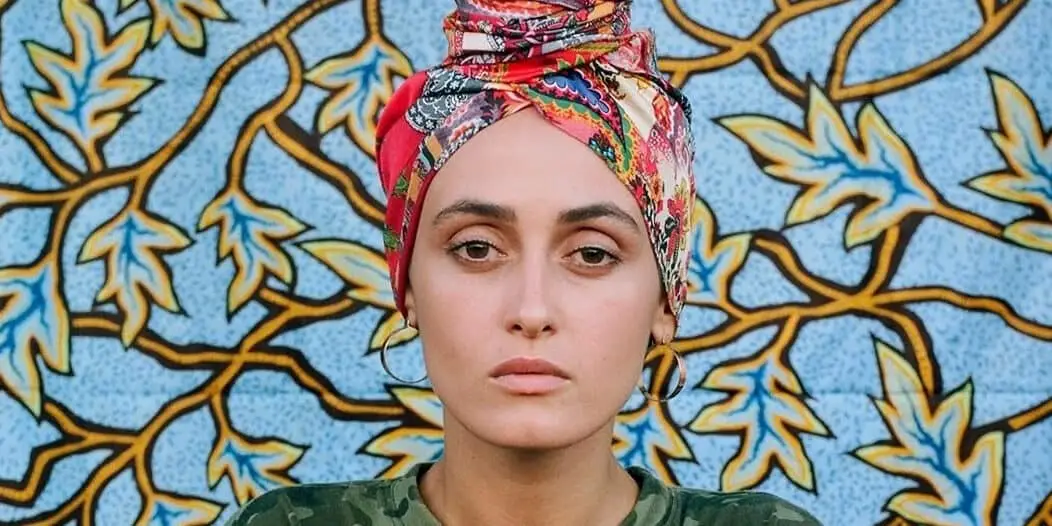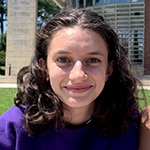When asked to describe herself, Alina Pash proudly declares that she is “100% Bitanga” (a word from the Rusyn language meaning “Hooligan”). True to that characterization, she often pushes boundaries through both her personal style and the content of her music. Not wanting to conform to anyone else’s agenda, she even created her own music label and successfully functions as her own producer. At only 29 years old, the singer, songwriter, and rapper has already garnered a fair number of accolades for her genre-defying music, which includes lyrics written in Ukrainian, Rusyn, Russian, and English.
Pash was born May 6th, 1993 in Bushtyno, a town located in the Zakarpattia Oblast in Western Ukraine. The name of the region literally means “Transcarpathian,” as it borders the Carpathian Mountains. The rich culture of this area is where Pash draws a great deal of her personal style, as well as the folk influences that shine through her work. The region counts Hungary, Poland, Slovakia, and Romania as neighbors and has significant cultural influences from the many ethnic groups that live there.
One of these ethnic groups is the East-Slavic people called Rusyns, also sometimes referred to as Carpatho-Rusyns, Rusnaks, or Ruthenians. At the heart of all of these names is the name Rus’ — a large East-Slavic early-medieval territory whose center was in Kyiv. Rusyns are from the Eastern Carpathian Mountains, a borderland region that primarily encompasses the Ukrainian region where Pash was born but also includes parts of Poland, Slovakia, and Romania. Rusyns speak Rusyn, which is an East Slavic language that uses the Cyrillic alphabet and has influences from languages such as Polish, Slovak, and Hungarian. It is said that the Carpathian Mountains that define the area in which the Rusyns reside isolated them, encouraging the formation of a separate identity.
Both the Rusyn language and the ethnic group themselves are the subject of some controversy, with some states (such as Slovakia and Poland) acknowledging their existence as a separate ethnic minority group with a distinct language. The Ukrainian government, however, considers them to be a subgroup of Ukrainians speaking a dialect of Ukrainian.
Among the Rusyns themselves, one can find a variety of views. Pash, for her part, speaks about her Rusyn identity as a part of her Ukrainian one. While she speaks proudly about her ties to the Rusyn culture of her hometown, she refers to Rusyn as “Ruthenian,” a name used more often than not by outsiders then by Rusyns themselves, who generally prefer the title “Rusyn.” Pash also refers to the Rusyn language as a dialect in artist profiles, interviews, and other materials. It is unclear whether she has done this in an attempt to market her work to outsiders, to reflect her personal beliefs about the issue, or as part of the Ukrainian national pride that underscores much of her work. Regardless of her position, she is one of very few musicians writing music that showcases the Rusyn (Ruthenian) language (dialect) and culture to an international audience as she melds together modern pop and the Transcarpathian folk traditions in which she was raised.
Pash was exposed to music at an early age. Her mother works as a music teacher, and Pash recalls singing throughout her childhood. Her first musical performance in front of an audience was when she was 6 years old. In her early teens, she would travel almost 75 miles away from her home to the town of Uzhgorod for voice lessons. In 2011, she continued her music education at The Academy of Circus and Variety Arts in Kyiv. During her time there, she also worked a number of jobs such as DJ and backup vocalist that allowed her to dip her feet into the music industry.
Full of ambition, Pash auditioned for The X Factor Ukraine in 2015 at 22 years old – while she was still a student. This would serve as her big break — not only did she gain a nationally televised platform, she placed third overall in the competition, impressing the judges and gaining fans. It also gave her the opportunity to be mentored by Nino Katamadze, a respected Georgian jazz singer. As the show concluded, she turned down multiple offers for representation. She was even asked if she wanted to join the well-established pop band KAZKA, to which she also said no — she was adamant that she wanted to make her own music on her own terms.
True to her wishes, she began to release her own music to great success. Her first single “Bitanga” was released in 2018, and is performed entirely in Rusyn. “When I finally decided to create my first song and try to launch my career, I had no doubts about the choice of language and style,” she said in an interview regarding her choice of language. “Many people thought I’d gone nuts. The Ukrainian language? A Transcarpathian dialect? Rap? Hell yes! It’s me.”
Pash soon started to release slick music videos as well, which gained traction on Youtube soon after release. In 2019, she released her first album titled PINTEA after the name of a legendary Carpathian warrior from the 17th and 18th centuries. The album was released in two parts: PINTEA:GORY (‘gory’ is the Ukrainian word for ‘mountains,’ referencing her home village) and PINTEA:MISTO (‘misto’ meaning ‘city,’ her new home of Kyiv). PINTEA:GORY includes the popular song “Bosorkanya” (“Sorceress” in English) which has over 1.5 million listens on Spotify to date.
In the years to follow, Pash’s music career only grew. Her self-created music label Bitanga Blood launched in 2020, and she began to work towards the goal of sponsoring a music festival in her native Zakarpattia Oblast. As she continued to release new tracks and embark on new projects, her reputation began to suffer slightly due to her involvement in political scandals. Amidst escalating tensions between Ukraine and Russia, Pash notably didn’t refuse to perform in Russia and agreed to perform at a festival there in 2018 much to the public’s disapproval since Ukraine had been boycotting the company funding the festival, Bosco di Ciliegi, since 2014. Pash defended her decision to perform there anyway, stating that “without dialogue, the future will never come. I understand that pacifism is not in fashion today, but I am for dialogue with those people who are ready for it.”
Her sets were canceled a few days later and she did not go to the festival, but the divisive sentiment of her statement remained. She soon became embroiled in an even larger scandal when it became known that she had traveled to Crimea via Moscow to perform at a friend’s wedding in 2014. She remains steadfast in her choice, pointing out that her friend was Ukrainian and the performance would take place at a Ukrainian wedding. This trip would come back to haunt her later, however. Now reflecting back, she has said that she felt powerless and that “being not such a media person at the time, I could not think of such consequences, which could then come out.”
Pash participated in the 2022 Vidbir competition — the contest that selects the artist that will represent Ukraine in that year’s Eurovision Song Contest. She entered her song “Shadows of Forgotten Ancestors,” a powerful folk-ballad written in a mix of Ukrainian and English. Her performance was wildly successful, earning a total of 15 points and taking first place in the competition. However, Vidbir added new guidelines in 2020 stating that participants would be disqualified for either having performed in the Russian Federation since 2014 or having traveled to Crimea by way of Russia to perform, a travel route which is now illegal under Ukrainian law. At first Pash claimed to have traveled legally by bus and through Ukraine, but it was discovered that her submitted travel documents were fakes. She admitted to lying about the trip and admitted that she had traveled via Moscow. Withdrawing her victory, she apologized for lying about her trip, stating that she has been in no way disloyal to her country and argued that: “My position is clear – we have been at war for eight years, Russia is an aggressor, Crimea is Ukraine, I went to Ukraine.”
Soon after this controversy, in 2022, Russia began what it calls its “special military operation” in Ukraine. Pash has since fled to the Czech Republic, stating that while she can take physical refuge, she cannot escape her overwhelming concern for her father, who has gone to fight with the Ukrainian army, and her concern for Ukrainian people everywhere. “It is a safe place for my body,” she says of her new home, “but not safe for my mind or my heart.” She continues to create music, determined to make use of her fame to spread awareness of Ukraine’s rich history, language, and culture. “I want to be the voice,” she says, “because I have it. I have some talent, thanks to God. And I’m going to use it for good.”











